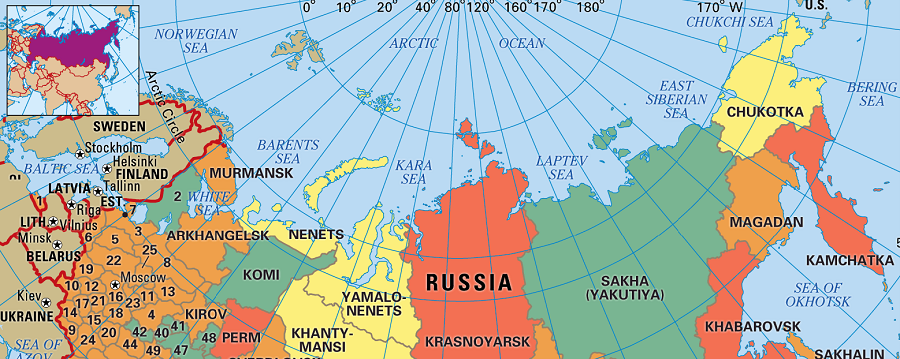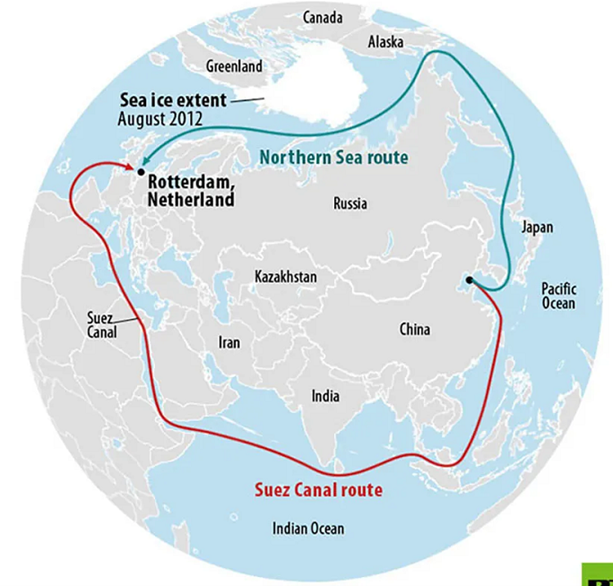RUSSIAN ARCTIC REGIONS STRENGTHEN BONDS WITH BEIJING
[Last week, 9/20, Paul Goble told us about China’s plans to separate the Middle Volga from Russia. We’ve long known about China’s plans to recapture Far Eastern Siberia. Now, as Paul explains this week, China may have plans to control Russia’s entire Arctic.]
Moscow has long declared that China’s role in the development of the Northern Sea Route (NSR) is a central part of their strategic cooperation. Despite this, the Kremlin cannot be entirely comfortable with the recent extent of Beijing’s expanding activities in the Arctic Sea.
Nor can Moscow be at ease with the Chinese government’s increasing ties with Russian regional governments in the Far North and along the coast of the Arctic Sea.
If any country other than China did the same, Moscow almost certainly would denounce such actions as neo-colonialism. If any country other than Russia did so anywhere else in the world, the Russian government would make the same pronouncement.
Given the international sanctions regime, Russia has little choice but to allow China to take these steps. Such actions carry the risk that the Russian-Chinese alliance may begin to collapse, with ever-more Russians concerned that Moscow is losing out to Beijing.
Russian commentators and officials have expressed concerns on this point with growing frequency over the past several years. Since Chinese President Xi Jinping’s summit with Russian President Vladimir Putin in March 2023, however, Russian analysts have published fewer articles on China’s actions in the Arctic.
This reflects the difficult position the Russian leadership finds itself in with international sanctions and the Putin government increasingly cracking down on narratives that challenge its basic foreign and domestic policy lines.
It would be a mistake to assume that the concerns Russians have expressed in the past have disappeared. Increased Chinese activities in the Arctic have likely had the opposite effect, even if there is less public acknowledgment.
Beijing’s moves in the Arctic since the spring of 2022 have taken on two basic forms: increasing scientific research in the Arctic Sea itself (Ru.arctic.ru, September 21) and expanding contacts with the heads of the littoral Russian regions (The Barents Observer, September 22).
It is Beijing’s efforts in hosting and then visiting leaders of the Russian regions on the Arctic Sea littoral that has the potential to unsettle relations of China and Russia.
Since last spring, Beijing has either hosted or sent its diplomatic and commercial representatives to visit the leaders of Murmansk Oblast (T.me/andrey_chibis, September 16), Arkhangelsk Oblast (Vk.com/a.tsybulskiy, May 16), the Komi Republic (Vk.com/vladimiruiba, May 23) and the Nenets Autonomous Okrug (Vk.com/juri_bezdudnyi, May 21). See Russa’s Arctic Regions map above.
The governors were predictably upbeat about growing Chinese involvement, as Moscow has cut subsidies to the regions due to the costs of the war in Ukraine. Beijing is more than ready to provide additional infusions of cash.
Moscow’s reaction to this Chinese diplomatic offensive has been muted. The state-owned Russian media largely ignored these contacts between the Chinese officials and Russian regional leaders.
A meeting in Moscow on September 7 between senior officials from Russia and China included the obligatory optimistic comments but failed to reach an agreement on any of the issues discussed. This included the future of international organizations such as the Arctic Council (Mid.ru, August 9).
Moscow has a compelling reason for such caution: the influx of Chinese money into these regions is likely to be followed by an influx of Chinese workers. This is all the more significant as the Russian populations in these areas are small and declining.
This growing Chinese presence runs the risk of affecting the political stances of the various regional elites. Already, Chinese migrants are close to, or soon will be, the largest ethnic group in some regions of the Russian Far East (Kasparov.ru, September 7).
Beyond these regions’ populations being quite small, Russians are leaving in massive numbers, allowing what might appear to be smaller groups of Chinese immigrants to have an outsized impact (RBC, September 13).
Such fears are undoubtedly on the minds of many in Moscow. Yet, the Kremlin might have a more immediate worry: As China has become involved in Russian regions elsewhere, it has given the leaders of these regions the political capital to parry Moscow’s demands (see TTP, September 20).
If that pattern holds in the Arctic, Moscow will become increasingly wary and more fault lines will likely begin to appear in the Russian-Chinese alliance.
Paul Goble is a longtime specialist on ethnic and religious questions in Eurasia. Serving in various capacities in the U.S. State Department, the Central Intelligence Agency, and the Voice of America, he has been decorated by the governments of Estonia, Latvia and Lithuania for his work in promoting Baltic independence and the withdrawal of Russian forces from those formerly occupied lands.



